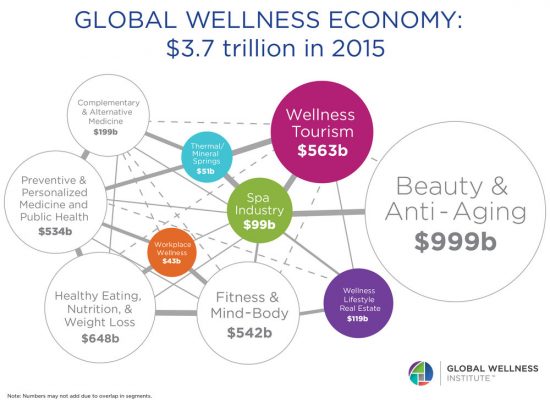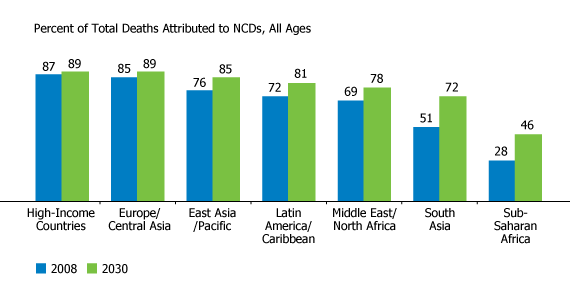
“Wellness is a way to cope with the demands and rigors of new modern lifestyles,” according to Ogilvy in their latest report, The Wellness Movement Pioneers: New Global Research Findings.
The report makes the case that the mass public are project-managing life adopting mental health, nutrition, physical activity and sleep to boost personal wellness. There is a big business model underneath this, which has inspired Ogilvy to start up the company’s Health & Wellness Practice. Think of this report as the group’s own business case to address the $3.7 trillion global wellness economy, illustrated by the first image.
The report synthesizes interviews the team undertook with so-called wellness pioneers, folks active in various aspects and geographies for healthy lifestyles.

In the section called “A sick planet,” the Ogilvy team points out that non-communicable diseases (NCDs) account for a growing share of mortality in both wealthy and developing nations. Once upon a time, infectious diseases killed most people on the planet; today, it’s NCDs like diabetes, heart disease, and lifestyle-influenced cancers (especially due to the risks of tobacco) that will kill most of us. Note the bar chart and dramatic growth of NCD mortality in South Asia and Sub-Saharan Africa.
How to address this? Ogilvy responds by pointing to the wellness movement and “salutogenesis:” moving from a mindset of what causes disease to what boosts health; from a reactive healthcare response to a proactive health input paradigm; and, from guarding against pain or loss to promoting for gain and growth.
There are several dozen pages of research to mine, but among the most overlooked topics in the social determinants of health literature is the section on social fitness. “We can’t all be gurus, but we can take part,” the authors assert. “Taking part” brings people together to support social fitness. Isolation kills; connectedness heals, research has proven.
“Homo Sapiens know how to adapt and change….Now we realize the impact modern life has on our health. We must make better choices if we want to get and stay well,” Ogilvy concludes.
This is the opportunity for Ogilvy, their wellness industry clients, and health consumers the world over.
Health Populi’s Hot Points: Ogilvy’s report re-confirms my latest work and learnings in the growth of retail health, which for morphing health consumers is a preferred way to “consume” healthcare: via self-directed value-based products and services that people curate in the context of their own health values.
“Values” here has a two-fold meaning: first, in terms of an individual’s own value-set of preferences, tastes, and cultural norms; and, “value,” a person’s definition of quality vs. price vs. personal utility for a good or service. As people in the U.S. face first-dollar coverage paying for healthcare in high-deductible plans and via health savings accounts, health spending is done with “their” money. That means that healthcare should look and feel like retail service experiences to gain loyalty and retain customers on an annuity basis. Health is not a one-off purchase but a lifelong continuum of personal investing.
In today’s health/wellness marketplace, the first area consumers are turning to is food, and increasingly a food-as-medicine paradigm. There is growing evidence on the role of (good, clean) food in health: the DASH diet, for example, has hard clinical evidence that the eating regime can reverse heart disease and help manage or fend off Type 2 Diabetes. Grocery stores continue to hire retail dietitians and nutritionists, coupling up with store pharmacies and continuing to blur food/health/healthcare adjacencies.
Each wellness area identified by the first graphic has at least a few savvy marketers who know how to reach, motivate, and successfully sell to health consumers. The healthcare industry’s legacy stakeholders — hospitals, physicians, health insurers and pharma — must get skilled in this increasingly consumer-driven health market to stay relevant in the growing world of wellness.
The post The Mainstreaming of Wellness appeared first on HealthPopuli.com.
The Mainstreaming of Wellness posted first on http://drugsscreeningpage.blogspot.com/
No comments:
Post a Comment